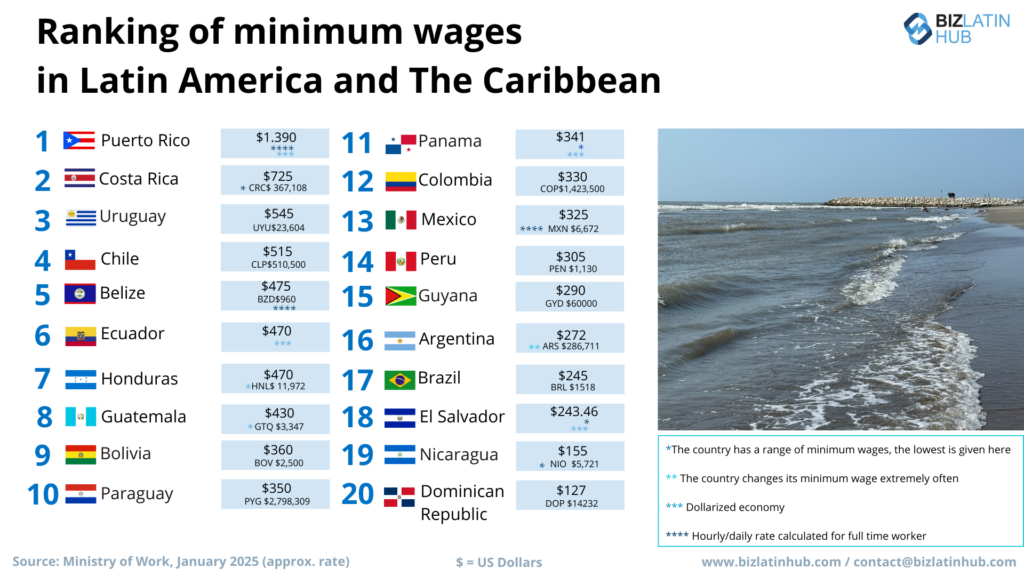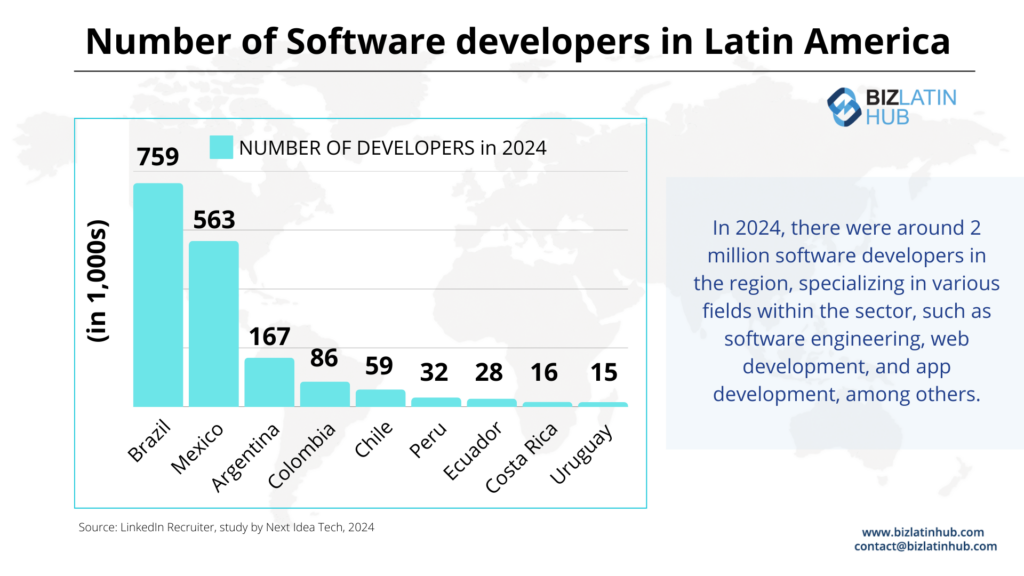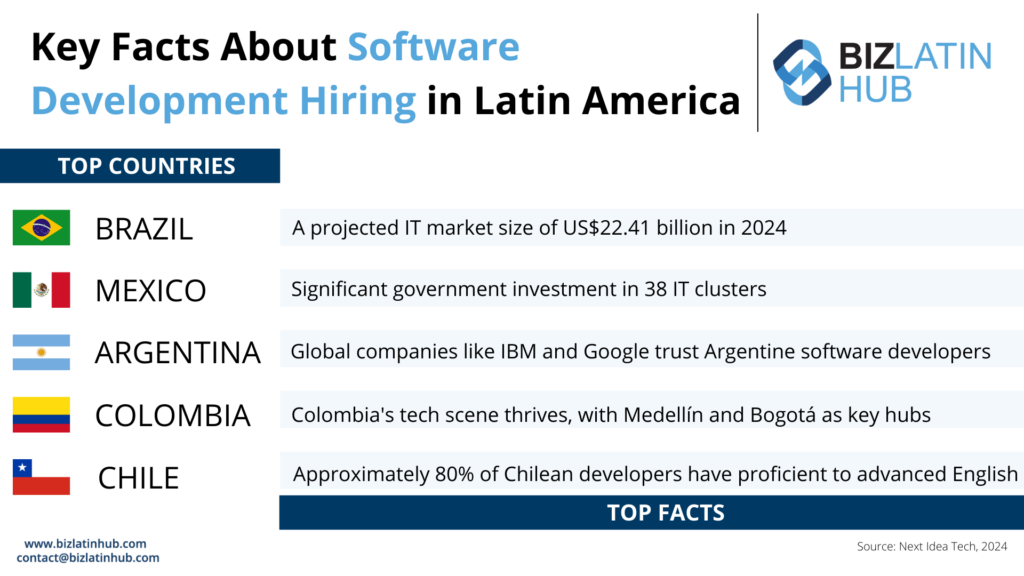A Growing Workforce in Latin America: Opportunities for Hiring, Recruitment & EOR in 2025
After company formation in Latin America, you will need to find employees. However, this is not always easy for a new entrant to the region, meaning you should seek specialist advice. A good recruiter will have expert knowledge of the local market and an established recruitment network to tap into, so should be able to find strong candidates quickly. If hiring software developers in Latin America interests you, the following article offers an overview of the market and advice on how and where to recruit. Businesses looking to hire software developers in Latin America must consider compliance regulations, recruitment strategies, and local talent availability.
Key takeaways on hiring in Latin America
| What are the key jobs for hiring in Latin America? | Key positions in Latin America include: Information security (Infosec) engineer. Full-stack developer. Data scientist. Machine learning engineer. JavaScript developer. Data Engineer. Cloud computing engineer. Backend developer/engineer. Salesforce developer. Automation engineer. |
| Steps to hiring in Latin America | A local advisor can help you with: Job adverts Networking CV assessment Interviewing Contract writing Onboarding |
| Is PEO legal in Latin America? | PEO is legal in most countries, but not all, so check with a local specialist before investing. |
| Are there minimum wages in Latin America? | The minimum wage in all countries is clearly laid out, some with variations for sector, location and so on. |
| Are there employer contributions in Latin America? | A certain percentage must usually be paid of an employee’s gross salary. |
Why is hiring in Latin America attractive?
Whether your business is thinking of expanding into the Latin American market, or you’re responsible for filling IT/tech roles in your corporation in North America or Europe, chances are hiring software developers in Latin America is high on your list. And if it’s not, it should be.
Reports reveal that what it costs to hire American tech talent in terms of salary, two or even three Latin American tech workers can be hired for roughly the same amount. For example, the average salary for a senior engineer in Latin America is $75,000 USD per year, while their counterparts in the United States make an average $150,000 USD a year.
Of course, what tech talent will accept as a fair wage will vary from one Latin American country to the next. Software developers, engineers, and other IT/tech workers in dollarized economies such as Ecuador, Panama, and El Salvador are likely to demand a bit more from US companies than others, where the local currency is weak against the US dollar. For this reason, there has been an uptick in hiring software developers in Andean countries.

Hiring software developers in Latin America, and other in-demand tech jobs
To meet the region’s expanding labor needs, companies are increasingly relying on professional recruitment services Latin America offers. Nearshoring has made Latin America a top region for hiring Full-Stack Developers, Back-End Engineers, and UX/UI Designers for North American companies. What follows is a list of the 10 most in-demand tech jobs in 2025:
- Information security (Infosec) engineer.
- Full-stack developer.
- Data scientist.
- Machine learning engineer.
- JavaScript developer.
- Data Engineer.
- Cloud computing engineer.
- Backend developer/engineer.
- Salesforce developer.
- Automation engineer.
That top-notch IT/tech talent can be found at a fraction of the cost of tech workers in North America and Europe should be enough to convince companies to begin hiring software developers in Latin America. But what other advantages are there?
6 benefits of hiring software developers in Latin America
- Tech talent is of a high caliber – Many companies hesitate to engage in nearshoring because they worry that paying less for tech workers means the work will be of poor quality. But Latin American developers are just as brilliant as their US counterparts.
- State-sponsored tech education – In the past decade, Latin America has become one of the most popular regions for nearshoring due to years-long government investments in tech-related educational programs.
- Emerging home-grown tech industry – The technology industry in Latin America is booming due to rapid growth over the past seven years. Venture capital investments in Latin American tech have been growing steadily, doubling annually since 2016.
- Few cultural differences – All countries in the Americas share more than a land mass in common, but also a similar cultural background that makes it easier to integrate diverse nationalities into a team.
- Moderate English proficiency – Many Latin American software developers have some level of English ability. In addition to being a required second language in most Latin American classrooms, English is widely spoken among the educated urban middle class in major Latin American cities.
- Same/similar time zones – Latin American software developers have nearly identical working hours as their American or Canadian counterparts. Latin America shares a full overlap with North America, allowing up to eight hours of synchronous work.
As talk of hiring software developers in Latin America is all the rage right now, it might come as a surprise to many that a large part of the market remains untapped. The sheer size of the labor pools of IT/tech talent in the region means that companies have no excuse for leaving tech-related positions unfilled.
The region is ideal for sourcing specialized roles such as DevOps Specialists, Mobile App Developers, and Salesforce Developers due to its affordable, bilingual workforce and strong technical education.
By some estimates, there are well over one million software developers and other tech workers in the whole of the region. But it may be the case that those companies simply don’t know how to tap into the vast tech labor pool. Many companies are turning to headhunting services Latin America-based firms offer to identify qualified professionals in executive and technical roles.

How to go about hiring software developers in Latin America?
What follows are 5 suggestions for how foreign companies can better navigate Latin America’s tech-talent landscape:
1. Do your research into each Latin American country
There are a significant number of tech workers in the region, but not all of them specialize in the same thing. Chile might have the best educational institutions for training data scientists, for example, while Colombia’s tech-focused universities tend to churn out DevOps developers. Depending on what kind of tech skills gap a company is seeking to fill, one or another Latin American country will be better at pursuing that particular IT/tech specialty.

2. Acquire knowledge about local universities and tech schools
Highly related to the first point – research should not only be done at the country level but the educational institution level as well. Understanding which schools have the best software development programs will empower companies to make better decisions when it comes time to enter a certain market in search of tech workers.
3. Post on Latin American, and international job boards
Job boards and talent-relationship management sites like Indeed, Greenhouse, and Lever tend to be fairly straightforward to use. You become a client, create a job opening, and wait for the applications to roll in. They are great tools for managing your hiring process, but going it alone in hiring has its pitfalls. Your job postings may get a lot of applications, but not necessarily from the specific type of tech workers the company needs.
4. Seek the services of a professional recruiter
In order to attract top-tier IT/tech workers in Latin America, a professional recruitment service with local knowledge and experience might be the wisest option. When it comes to hiring software developers in Latin America, recruiters can help companies sift through the slush pile of applicants to find top talent. Recruitment firms can assume varying levels of involvement in the process, from managing the entire hiring and onboarding lifecycle to finding promising candidates and forwarding their CVs to a hiring manager.
5. Make your company a great place to work
From a software developer’s perspective, a company is considered good if it offers a good salary, bonuses, benefits and other perks like paid time off, the ability to take off national holidays in their home countries and receive co-working stipends and stock options. The company should have an excellent work environment and culture, and not treat 100-percent remote workers differently than those who come into the office every day.
How much it costs to hire people in Latin America
The cost of hiring in Latin America is less than it would be in richer nations, yet workers are often well qualified and skilled. With significant investment in education over a number of years, the region now has a surfeit of graduates in the labor market that it cannot provide local jobs for. This means that the labor market is relatively competitive for an incoming prospective employer.
The minimum wage in most countries is clearly laid out. However, this is not necessarily the rate that you should be offering. In top sectors that require qualified and skilled workers, you will need to offer at least market standard rate. A local hiring expert in Latin America will be invaluable in making sure that you are not overpaying or offering unattractive rates that make it hard to recruit quality talent.
Employers in Latin America must usually make social security contributions equal to a certain percentage of an employee’s wage. The employer must also withhold tax from an employee’s remuneration, normally on a progressive rate. Annual bonuses known as aguinaldos are common, usually equal to an extra month’s salary. In some countries, profit sharing is a legal requirement.
Two options for hiring: establish a company or PEO
When entering the market and hiring in Latin America, there are essentially two options available to investors and entrepreneurs. The most common way of doing so is through full company formation to establish a presence in the jurisdiction. However, this may take time and effort, meaning that it is worth considering another option as well, using a Professional Employer Organization (PEO).
PEO: fast and agile
A Professional Employer Organization (PEO), also known as a ‘Registered Employer’ or ‘Employer of Record (EOR)’, is an organization that provides and supports companies with their human resources functions, from the early stages of recruitment to the payment of taxes and benefits. PEOs undertake the fundamental and time-consuming tasks of human resources teams, allowing companies to focus on the growth and success of their business.
The services of a PEO are particularly useful when businesses seek to hire a local workforce but do not wish to establish a local legal entity. Simply put, a PEO or EOR makes it easy to hire staff in any country in Latin America through an outsourced provider.
It means you can enter the market and start hiring quickly, without having to commit to full entry until you are sure that it is what you want to do. It is worth noting that regionally there is beginning to be more regulation and PEO may not be viable in the future. Some countries have already outlawed it.
The long-term option: direct hiring
This is the gold standard of hiring in Latin America, as it will give you full control over your employees as well as being sure that you will be compliant for the long term. It also gives you a higher status with potential job applicants, who will see you as a more secure long-term employer.
Before you start hiring employees in any country, you will first need to get a sense of the legal, financial and cultural lay of the land. Things such as how to sort out the red tape associated with incorporation and how to manage payroll, for example. With a permanent legal presence, you will be fully liable for compliance with local law.
A local expert will help when hiring in Latin America, as they will have an extensive network of qualified professionals for top jobs as well as a good idea of the local labor market. They will be able to advise on the best rates to offer and what type of profile you should be targeting. With anti-discrimination legislation important in the region, especially for top jobs, they can make sure you are making a fair offer which complies with local law.
After placing adverts and receiving applications, you will want to move towards interviewing potential candidates. This should be done by both a team manager and HR representative at minimum, to make sure that everything is watertight in legal terms. You may want to include other people into the process in order to make a better assessment of the candidate.
It is entirely possible that you may wish to have a second interview, possibly involving other team members as discussed above. It is also common in the region to provide candidates with an aptitude task to be completed. This usually takes the form of a dummy task that simulates the type of job that will be done in the future and confirm that they possess the skills cited on their CV.
Contracts, too, will be important. A local advisor will be up to speed on what you can and cannot offer. Bear in mind that you will have to follow all the rules established by the country. This usually includes clear conditions for the end of a fixed term contract or project-based work.
Finally, your local advisor will be able to help you with the stages of both the hiring and onboarding process. They will make sure that you comply with standard requirements such as compulsory medical checks and make sure that any probation period is within the boundaries of those established by the local labor law. This is generally a month or two, but some countries do not allow probationary periods.
Labor laws and regulations in Latin America
Before making a move into the jurisdiction, it’s important for companies to understand the labor rights and responsibilities of both employers and employees in Latin America. The region generally has fairly good labor rights on paper, meaning that employees have a good level of protection.
What follows are a few things that foreign business owners should know about when it comes to the local work culture:
- Work hours – The standard workday in the region is eight hours, with the standard workweek usually up to 48 hours, with most countries being over 40.
- Public holidays – There are many public holidays in Latin America each year, expect 12-20.
- Vacation time – Workers in Latin America are normally eligible for 15-30 days of vacation annually. Women are entitled to 12 or more weeks’ maternity leave.
- Contract types – There are essentially two types of contract in the region, indefinite employment and fixed-term employment. The former is much more common and some countries have strict restrictions on the latter.
FAQs when attracting and hiring talent in Latin America
Based on our extensive experience these are the common questions and doubts of our clients when looking to hire in the local market.
Hiring tech talent in Latin America offers access to a large talent pool that is located in the same time zone as the North American market, is culturally similar, and is more economical. The combination allows a company to complement an existing North American based team or to establish an independent nearshoring center within the region.
Yes, you can hire top tech talent in Latin America. The region possesses a large talent pool of bilingual technology and engineering professionals with extensive experience working with both local and international companies. There are currently 1,869 higher-education institutions in Latin America, with 428 of these eligible for QS top universities consideration, with Brazil, Argentina, Colombia, Mexico, Costa Rica, Peru, and Panama the regional leaders.
Latin America has approximately 5.4 million speakers, with Argentina, Bolivia, Paraguay, Costa Rica, and Chile tanking the highest on the English Proficiency Index.
The Association of Computer Science and Information Technology states that there are over 2 million tech professionals within Latin America
Yes. Using an Employer of Record in Latin America allows you to legally hire employees without setting up a local entity. This approach ensures compliance and simplifies market entry.
Although EORs are fast and convenient, they tend to be more costly per employee and may be less appealing to senior-level candidates. Prolonged use may also expose your business to permanent establishment risks.
If you’re planning a long-term operation or hiring multiple employees, setting up a company in Latin America is often more cost-effective and better suited to building local operations and culture.
Entity vs. EOR in Latin America: What’s the Right Hiring Strategy for 2025?
Businesses entering the Latin American market in 2025 have two primary options for hiring: setting up a local legal entity or using an Employer of Record (EOR). While both are valid, setting up a company in Latin America is generally the preferred long-term solution — offering better control, cost efficiency, and talent acquisition opportunities.
Why Setting Up a Company in Latin America Is the Preferred Option
For businesses planning sustained operations or building a local team of any size, establishing a legal entity in Latin America is the most strategic and sustainable approach. It gives you direct control over employment contracts, builds trust with local talent, and strengthens your brand presence in the region.
Advantages of Entity Setup:
- Lower long-term employment costs
- Greater flexibility in hiring and compensation
- Easier to attract and retain top-tier local talent
- Better alignment with your company culture and processes
- Stronger local credibility with clients and partners
Establishing a local company is especially beneficial when hiring long-term roles such as Project Managers, Software Engineers, JAVA Engineers, and Customer Success Managers who contribute to core business operations.
Biz Latin Hub provides full support to set up a company in Latin America, including legal entity registration, corporate bank account setup, labor law compliance, and ongoing back-office administration.
When to Consider an Employer of Record (EOR)
An Employer of Record in Latin America is useful for companies that want to hire quickly, test the market, or take on short-term contracts without establishing a local company. Under this model, your employees are officially hired through Biz Latin Hub’s local subsidiary while you retain management control.
Advantages of EOR:
- Fast onboarding – ideal for pilot hires or short-term projects
- No need to incorporate a company
- Simplified legal and compliance management
Disadvantages of EOR:
- More expensive per employee over time
- May be less attractive to senior or strategic hires
- Harder to build long-term company culture
- Extended use can trigger permanent establishment risks
EOR is a tactical option for quick deployment, but if you plan to build a team, expand your footprint, or operate in Latin America beyond the short term, we strongly recommend setting up your own legal entity as the more robust and cost-effective solution.
Biz Latin Hub can help you with hiring software developers in Latin America
At Biz Latin Hub, we provide integrated market entry and back-office services throughout Latin America and the Caribbean, with offices in Bogota and Cartagena, as well as over a dozen other major cities in the region. We also have trusted partners in many other markets.
Our unrivaled reach means we are ideally placed to support multi-jurisdiction market entries and cross-border operations.
As well as knowledge about hiring software developers in Latin America, our portfolio of services includes hiring & PEO, accounting & taxation, company formation, and corporate legal services.
Contact us today to find out how we can assist you in finding top tech talent, or otherwise do business in Latin America and the Caribbean.
If this article on hiring software developers in Latin America was of interest to you, check out the rest of our coverage of the region. Or read about our team and expert authors.






